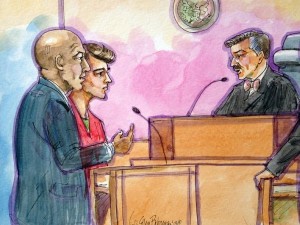Prosecutors in Silk Road trial rest case; jurors to deliberate
 Jurors will begin deliberating as early as Wednesday morning the merits of the case against 30-year-old Ross Ulbricht, who faces potential life in prison for alleged crime relating to his alleged operation of the online black-market bazaar Silk Road, reported the Wall Street Journal.
Jurors will begin deliberating as early as Wednesday morning the merits of the case against 30-year-old Ross Ulbricht, who faces potential life in prison for alleged crime relating to his alleged operation of the online black-market bazaar Silk Road, reported the Wall Street Journal.
The newspaper said that in the trial’s closing arguments on Tuesday, prosecutors accused Ulbricht of launching Silk Road from the start as a means to sell illegal drugs, and alleged that he is the true identity of “Dread Pirate Roberts,” the online alias used by Silk Road’s operator.
“It was his baby, and he stayed with it enthusiastically for nearly three years,” said Assistant US Attorney Serrin Turner to jurors Tuesday, as reported by the Wall Street Journal. “It was his secret livelihood. It was his passion.”
Early on in the trial, Ulbricht’s lawyers conceded that their client had created Silk Road, but argued that he handed off the website to others after a few months and was lured back to “take the fall.” (The defence had suggested the real mastermind behind Silk Road was Mark Karpeles, who ran the now-defunct Mt. Gox Bitcoin exchange). Joshua Dratel, Ulbricht’s lawyer, told jurors that they should dismiss all of the government’s digital evidence as it could have been fabricated by someone else to incriminate his client.
“The Internet denies us the ability to say for sure…what is transparent and what is hidden,” said Dratel in court Tuesday, adding that “you never know who precisely is on the other side of that computer.”
The Wall Street Journal reported that in his closing arguments, Turner retraced the digital clues that led federal investigators to Ulbricht, including thousands of pages of evidence retrieved from his email account, Silk Road servers, and his laptop. Turner recounted how Ulbricht’s Facebook pictures and message allegedly matched up with personal details Dread Pirate Roberts include in messages with Silk Road staff members.
Federal investigators also found on Ulbricht’s laptop a spreadsheet of Silk Road expenses and a journal that purportedly detailed how he created the website by growing his own hallucinogenic mushrooms in a cabin.
“There were no little elves that put all that evidence on the defendant’s computer,” said Turner.
The Wall Street Journal reported that Dratel argued that computer files can be easily modified or manipulated, stating that there are “a lot of blinking neon signs in this case that have been created to incriminate Mr. Ulbricht.”
“Keeping a journal like that and saving it on your laptop? A little too convenient,” Dratel said. “Does that sound like [Dread Pirate Roberts]?”
Dratel said it was never Ulbricht’s intention to create a drug website; instead he wanted to launch a site where “anyone can sell anything,” in the same vein as Amazon.
On Monday, Ulbricht told US District Judge Katherine Forrest, who is overseeing his trial, that he would not testify in his own defense, reported the Wall Street Journal’s Law Blog.
The blog said some legal experts had said putting Ulbricht on the witness stand would be a risky move as it would leave him vulnerable to a tough cross-examination by the prosecutors.
The same day, Judge Forrest threw out two expert witnesses for the defense: Bitcoin entrepreneur Andreas Antonopolous and Columbia University computer science professor Steven Bellovin. Ulbricht’s lawyers disclosed the two witnesses last week, but Judge Forrest said it was a “belated and substantially inadequate notice.” She said she was unable “to properly assess” the witnesses’ qualifications as the defense failed to state what opinions the witnesses would offer. “A defense preference for trial by ambush is legally unsupportable,” the judge wrote.
The Law Blog said that earlier on Monday, prosecutors delved deeper into evidence that purportedly showed Ulbricht commissioned the murder of five Silk Road users to protect the site.
A user named FriendlyChemist had been blackmailing Ulbricht, threatening to disclose the identities of dozens of other Silk Road users unless Ulbricht paid him half a million dollars, according to prosecutors, who read from chats retrieved from the Silk Road server.
According to prosecutors, Ulbricht then allegedly asked a Silk Road user named redandwhite to kill FriendlyChemist. In a series of chats that read like a regular business transaction, prosecutors showed Ulbricht allegedly negotiated the price of the assassination job with redandwhite, reported the Law Blog.
“If you want it to look like an accident, it would cost a lot more,” wrote redandwhite, ultimately settling on a $150,000 commission.
Ulbricht allegedly wrote, “I’ve only ever commissioned…one other hit, so I’m still learning this market.”
After redandwhite claimed the job was done, prosecutors alleged that Ulbricht paid another half a million dollars for the assassination of four other people who were associated with FriendlyChemist.
FriendlyChemist’s threats were “unforgiveable,” Ulbricht allegedly wrote. “Especially here on Silk Road, anonymity is sacrosanct.”
The Law Blog reported that prosecutors have said in previous court documents that there is no evidence any murders actually occurred.
Prosecutors had brought evidence of alleged murder plots to court last week. “In my eyes, FriendlyChemist is a liability and I wouldn’t mind if he was executed,” wrote Dread Pirate Roberts to redandwhite in a March 25, 2013 message that a prosecutor read aloud in court last Thursday, as reported by Bloomberg. redandwhite claimed he was a drug supplier whom FriendlyChemist owed money, according to the government.
Also on Thursday, former FBI special agent Ilhwan Yum showed the court that he traced hundreds of thousands of Bitcoins from Silk Road directly to Ulbricht’s personal computer, reported Wired.
Yum described how he traced 3,760 Bitcoin transactions over a 12-month period ending in late August 2013 from servers seized in the Silk Road investigation to Ulbricht’s laptop, which the FBI confiscated at the time of Ulbricht’s arrest in October 2013. In all, Yum followed more than 700,000 Bitcoins along the block chain from Silk Road to what appeared to be Ulbricht’s personal wallet. Based on exchange rates at the time of each transaction, Yum calculated that the transferred Bitcoins were worth $13.4 million.
Wired reported that Yum’s testimony confirmed what most savvy Bitcoin users already know: the digital currency is by no means untraceable or anonymous by default. The magazine reported that University of California Berkeley computer science researcher Nicholas Weaver had already demonstrated he was able to follow more than 29,000 BTC from Silk Road to Ulbricht’s laptop based solely on publicly available information. With access to Ulbricht’s hard drive, prosecutors had far more success. Almost 500,000 of the 700,253 BTC were transferred between September and November 2012, explaining their relatively low total exchange rate.
Wired noted that the total trail of drug-tainted coins represented more than four times as many Bitcoins from Ulbricht’s laptop than have yet been found and seized in the Silk Road investigation. The magazine said it is still unclear from Yum’s testimony where the remainder ended up.
In his cross-examination of Yum, Dratel called into question whether Yum had conducted the analysis all by himself or depended on a colleague at FTI Consulting, the government contractor where Yum now works. Wired reported that when Yum admitted that he had done just 40 hours of work on the analysis, and that 60 hours had been done by a cryptologist named Matthew Edman, Dratel moved to have Yum’s testimony struck from the record as “hearsay,” but Judge Forrest denied the motion, ruling that Yum was sufficiently involved in the analysis.
Dratel also asked Yum whether Ulbricht might have simply used Silk Road as a Bitcoin wallet, an alternative explanation for his withdrawals from the website.
“Yes, it could be done,” admitted Yum in a skeptical tone, reported Wired. “I wouldn’t maintain my bitcoins that way.”
Meanwhile, Ulbricht’s parents have spoken out in an interview with CNNMoney, maintaining their son’s innocence.
Asked to recount the moment she got the call that her son was in trouble, Lyn Ulbricht said, “It was shocking because Ross had never been in trouble and has no record of anything.” Kirk Ulbricht added, “It was like a bomb went off in the house. We had no idea anything like that was coming.”
Lyn described her son as “a stellar human being. He is such as fine person – friendly, compassionate, caring – and has demonstrated that his whole life.” Asked why she thought her son created Silk Road, Lyn said, “He’s very idealistic and I could see Ross thinking, ‘I want to create an open market where people can freely trade.’ Ross was the perfect fall guy because he’s very trusting.”
In the interview, CNNMoney correspondent Laurie Segall noted the Ulbrichts wanted to speak out due to their frustration with the trial.
Lynn said, “The most frustrating thing is that evidence that is favorable to Ross is being suppressed. This came out in the cross examination for the first witness – DHS Agent Jared Der-Yeghiayan, who was on the Silk Road case for two years investigating it. [He] never came across Ross’ name but did…pinpoint another name which he said was Mark Karpeles. He was closing in on [Karpeles] when another DHS agency [inadvertently] tipped off Karpeles. The next thing that happened, according to this evidence, is that Karpeles’ lawyer approached this DHS agency and said look, “You don’t charge me with the financial crimes you’re charging me with and I’ll give you the name of DPR [Dread Pirate Roberts].” Two weeks later, Ross was arrested and Karpeles has never been charged. [The judge later ruled] that much of that testimony must be stricken from the record.”
Asked if there is a whole other side of Ross his parents just didn’t know about, Kirk said, “I feel like I know Ross as well as a father can know a son. We were very close. We’ve heard how many chat logs and conversations between DPR and these other people. DPR didn’t talk like Ross or write like Ross. It’s just not Ross.”
Segall also asked the Ulbrichts what they saw as the larger implications of their son’s trial.
Lyn responded, “You know there is a big issue of transferred intent here, which is, can you hold an alleged website host responsible for actions of the users on his site? If a precedent is set for that, many people have said it puts a crack in the door for the government to find something illegitimate on a site and be able to hold that website responsible for that. That will put a chill on the Internet.”











